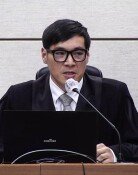Korea Losing Edge in High-Class Service Industries
Korea Losing Edge in High-Class Service Industries
Posted August. 05, 2005 04:58,
Park (42), who works for a real estate consultancy in Gangnam, Seoul, had a check-up on February and a tumor was found in around the pit of his stomach. He went to A general hospital and underwent a computer tomography procedure. However, a doctor suggested checking again six months later as cancer is not easy to detect.
So he went to an agency that recommends medical services abroad. A month later, he received treatment at the M.D. Anderson Cancer Center in Houston, Texas. An American doctor kindly explained how the operation would proceed.
The tumor turned out to be not cancerous, and the operation was completed successfully. It cost him about 40 million won to be hospitalized for three days and undergo the operation.
Park was satisfied and said that given the confidence he felt while receiving treatment and the high-quality medical treatment technology, he didnt think it was expensive.
The number of people who seek alternative medical choices abroad is increasing as Korea is losing its competitive edge in high-class service industries such as medical treatments, education, and tourism, which are higher value-added businesses. Recently, this trend is spreading in the middle class as well as the high-income bracket.
In the first half of this year, earnings and expenses of the service sector in Korea reached a record $6.13 billion (approximately 6.13 trillion won). It is analyzed that this is due to the surge in studying abroad, studying foreign languages, overseas travel, and medical services.
According to a report titled Global industrialization strategy on medical and education services published by the Korea Chamber of Commerce and Industry, it is analyzed that if the expenses of studying abroad, some 2.8 trillion won, were spent in Korea, they could have produced 95,000 jobs.
Yu Byung-gyu of the Hyundai Economic Research Center said that while people in the high-income bracket spend more money abroad than in Korea, domestic spending is getting slacker. He also said that sentiment against the rich should be overcome and that a systematic framework and an atmosphere that would encourage rich people to spend more money at home should be established as soon as possible.






![“설거지해도 그대로”…냄비 ‘무지개 얼룩’ 5분 해결법 [알쓸톡]](https://dimg.donga.com/c/138/175/90/1/wps/NEWS/IMAGE/2026/01/15/133164664.3.png)
